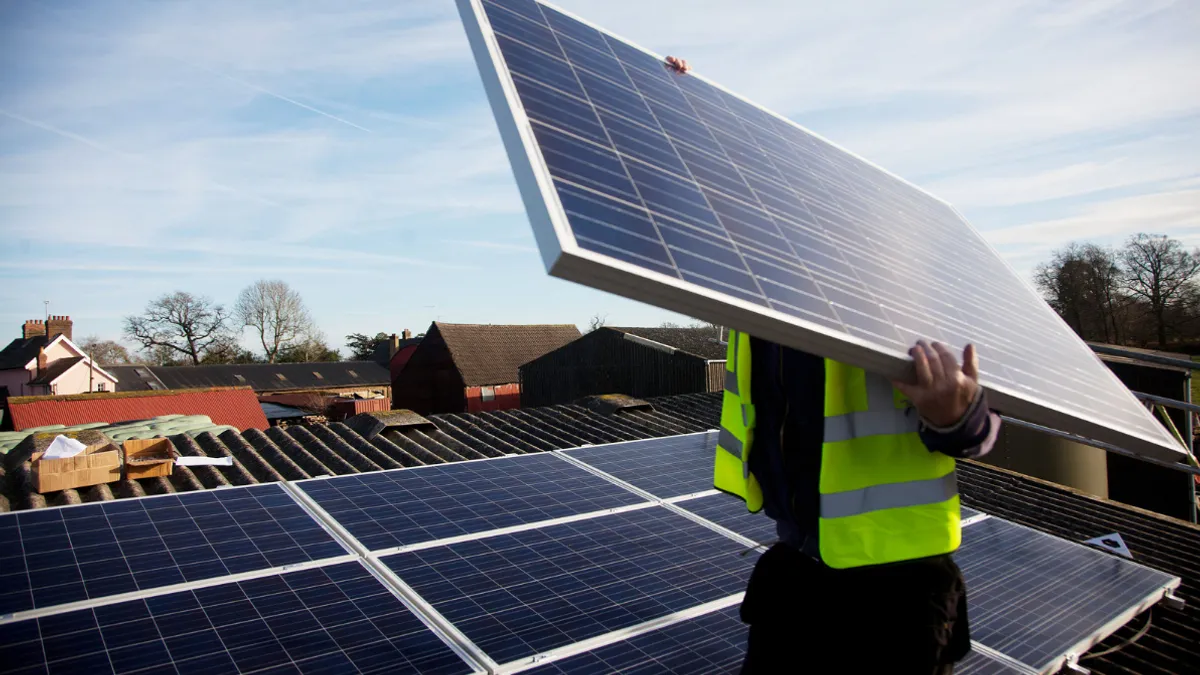Dive Brief:
- Arizona's Salt River Project (SRP) may be liable for antitrust violations customers say occurred when it raised electrical rates for customers with rooftop solar panels, according to a 9th Circuit Court of Appeals ruling issued on Monday.
-
According to the ruling, because the public power utility sets its own electric rates, it does not benefit from the legal protections enjoyed by regulated entities. The decision to raise rates after its own attempt to enter the solar market failed is grounds for antitrust litigation even if the rooftop solar market continued to thrive, according to the court.
-
The ruling could establish an important precedent for other suits regarding rooftop solar, according to Court Rich, an attorney specializing in energy and regulatory law and co-founder of the Rose Law Group in Arizona. However, the ruling may only apply to state-owned utilities that don't answer to regulatory commissions, given the specifics of the case.
Dive Insight:
Utilities with the legal authority to set their own rates may not be exempt from antitrust litigation if they use that authority to price competing services out of the market, according to the 9th Circuit Court of Appeals.
A panel of judges from the court ruled on Monday that a case against Salt River Project in Arizona may proceed in spite of being initially dismissed by a lower court. The previous court had decided that although SRP is subject to antitrust litigation, the customers who sued the utility had failed to establish that SRP's decision to raise rates in 2015 had injured the solar industry. But after reviewing the facts of the case, the 9th Circuit Court of Appeals found that there is sufficient ground for the case to proceed.
The court rejected a defense raised by SRP, which argued that its actions did not violate antitrust law because the rooftop solar industry is thriving in Arizona in spite of the rate increase. Writing for the court, Judge Eric D. Miller noted that SRP's decision to raise rates could represent "coercive activity" intended to render independent solar systems uneconomical — activity that could warrant litigation. And because SRP's board of directors is not subject to oversight by the Arizona Corporation Commission, the state law that protects regulated utilities from antitrust litigation does not apply to SRP, Miller concluded.
Miller also noted that SRP had previously created financial incentives for customers who installed solar panels. However, these incentives were eliminated and rates raised after SRP's own attempts to enter the solar energy market did not bear fruit.
The ruling did, however, affirm the previous court's finding that the Local Government Antitrust Act shields SRP from federal antitrust damages — a positive outcome from SRP's perspective.
"With regard to the few remaining claims that were remanded to Judge [Susan] Brnovich [of the Arizona district court] for additional proceedings, SRP is confident that the SRP Board actions...will be determined to have been rationally considered and adopted, and not in violation of any law or statute," SRP spokesperson Scott Harelson said in a statement. "SRP believes that the few remaining claims in the plaintiff's allegations are without merit and that SRP will ultimately prevail in this matter."
But whether or not they do prevail in the long run, the 9th Circuit decision could establish an important precedent for future cases, according to Rich.
"It's been completely obvious for a decade now that utilities are ganging up on rooftop solar," Rich said. "If that's not antitrust, I don't know what is. This decision makes it easier to get a remedy and will hopefully make utilities think twice about their monopolistic actions."
But because the court indicated that their decision hinged on SRP's ratemaking authority, Rich said, the outcome of the case may not apply to investor-owned utilities subject to regulatory oversight.
The Arizona decision follows a ruling in another rooftop solar case in Indiana, where the Indiana Court of Appeals ruled that Southern Indiana Gas and Electric Company, a subsidiary of CenterPoint Energy, violated state law when it transitioned from net metering to instantaneous netting. The utility's new method of calculating customers' bills, according to the court, did not comply with state law. In Indiana, regulated utilities are required to charge customers based on the difference in the amount of power consumed and the amount of energy provided to the grid.
"CenterPoint Energy believes rightsizing the payment made to customers that return energy to the grid is important to ensure a balance between the interests of customers that own generation and those that do not," company utility spokesperson Alyssia Oshodi said in a statement in response to the court's decision. "CenterPoint Energy's Rate EDG [Excess Distrubed Generation] replaced a payment structure that resulted in customers without their own generation subsidizing customers with generation, even though all customers continue to depend on CenterPoint Energy's infrastructure."














